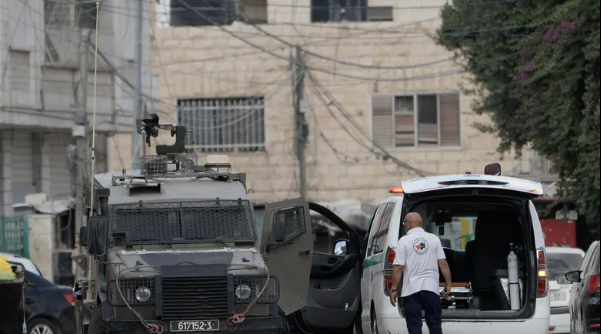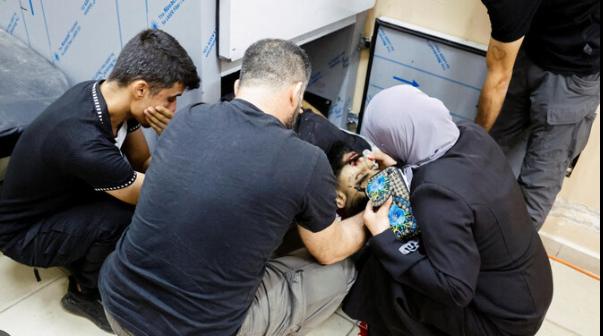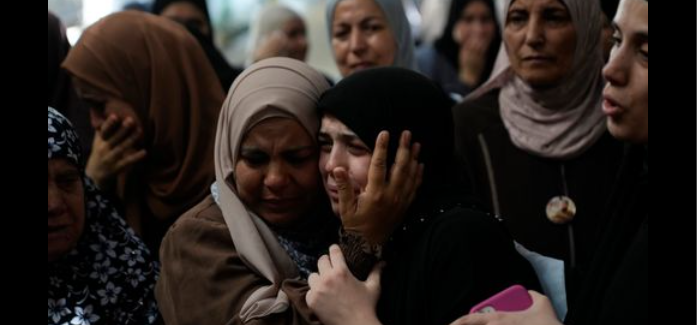Israeli Raids Across Occupied West Bank Kill:-
In a stark escalation of violence, Israeli raids across the occupied West Bank have left nine Palestinians dead, according to Palestinian officials. This latest surge in hostilities is part of a broader pattern of increasing tensions in the region, as both sides continue to engage in a deadly cycle of violence. The incident has drawn widespread condemnation and raised concerns about the potential for further escalation, deepening the already complex and volatile situation in the Middle East.
This article delves into the details of the recent raids, the historical context, the reactions from the international community, and the broader implications for peace and security in the region.
The Raids: A Deadly Operation
According to Palestinian officials, Israeli Raids Across the Israeli military conducted a series of raids across multiple locations in the occupied West Bank. These raids targeted what the Israeli Defense Forces (IDF) described as “terrorist infrastructure,” but Palestinian authorities and human rights organizations have characterized them as indiscriminate and excessive use of force.  for more information click on this link
for more information click on this link
Locations and Casualties
- Nablus: One of the main sites of the raids was the city of Nablus, a frequent flashpoint in the conflict. According to reports, Israeli Raids Across several homes were stormed by Israeli forces, leading to armed confrontations with local militants. The clashes resulted in the deaths of several individuals, including both combatants and civilians caught in the crossfire.
- Jenin: In the city of Jenin, another hotbed of resistance against Israeli occupation, the IDF targeted a group allegedly planning attacks against Israeli targets. The operation led to a fierce gun battle, with multiple casualties reported on the Palestinian side. Among the dead were members of local militant groups, but also civilians, including at least one teenager.
- Hebron: In Hebron, one of the most divided cities in the West Bank, Israeli forces conducted a pre-dawn raid, leading to the deaths of two Palestinian men. Local sources claimed that the men were unarmed and were not involved in militant activities, a claim that the IDF has disputed.
- Ramallah: The administrative capital of the Palestinian Authority also saw confrontations as Israeli forces conducted operations in nearby villages. While no deaths were reported in Ramallah itself, the raids sparked widespread protests and clashes Israeli Raids Across , with several injuries reported.
 for more information click on this link
for more information click on this link
Palestinian Response
Palestinian officials have condemned the raids as a brutal act of aggression, accusing Israel of carrying out extrajudicial killings and violating international law. The Palestinian Ministry of Health confirmed the deaths of nine individuals and reported that dozens of others were injured, some critically. Palestinian President Mahmoud Abbas described the raids as “a massacre” and called for international intervention to protect Palestinian civilians.
Human rights organizations have echoed these concerns Israeli Raids Across, calling for independent investigations into the killings. They argue that the Israeli military’s actions constitute a disproportionate use of force and that many of those killed were not actively involved in hostilities.
Historical Context: A Cycle of Violence
The recent raids are not an isolated incident but rather part of a long-standing cycle of violence in the Israeli-Palestinian conflict. The West Bank, occupied by Israel since the 1967 Six-Day War, has been a constant flashpoint for violence, with frequent clashes between Israeli forces and Palestinian militants, as well as between Israeli settlers and Palestinian residents.
The Occupation and Resistance
- The Occupation: The Israeli occupation of the West Bank, which has lasted for more than five decades, is at the heart of the Israeli-Palestinian conflict. The occupation has been marked by the establishment of Israeli settlements, which are considered illegal under international law, and by military control over Palestinian cities, towns, and villages.
- Palestinian Resistance: Resistance to the occupation has taken many forms, ranging from peaceful protests and diplomatic efforts to armed struggle. Over the years, various Palestinian militant groups have emerged, some affiliated with larger political movements like Hamas and Islamic Jihad, while others operate independently. These groups frequently clash with Israeli forces, leading to cycles of retaliation and counter-retaliation.
- Israeli Security Concerns: Israel justifies its military operations in the West Bank as necessary for the security of its citizens, particularly in light of ongoing threats from militant groups. The Israeli government argues that preemptive raids and targeted killings are essential to preventing terrorist attacks, which have claimed numerous Israeli lives over the years.
Recent Escalations
The situation in the West Bank has been particularly tense in recent months, with a noticeable increase in violence. Several factors have contributed to this escalation, including:
- Political Uncertainty: Both Israeli and Palestinian politics have been marked by instability. Israel has undergone multiple elections in a short period, leading to fragile coalition governments. On the Palestinian side, divisions between Fatah, which controls the West Bank, and Hamas, which controls Gaza, have weakened the Palestinian leadership’s ability to present a united front.
- Settlement Expansion: The continued expansion of Israeli settlements in the West Bank has fueled tensions. Settler violence against Palestinians has also been on the rise, leading to retaliatory attacks by Palestinian militants.
- International Developments: Shifts in international diplomacy, including the normalization of relations between Israel and several Arab states under the Abraham Accords, have changed the dynamics of the conflict. Many Palestinians feel increasingly isolated as their traditional allies engage with Israel, leading to frustration and anger.
International Reaction
The international community has reacted with concern to the recent escalation in violence. The United Nations, European Union, and several countries have issued statements condemning the loss of life and calling for restraint on both sides.
United Nations
The UN has long been involved in efforts to mediate the Israeli-Palestinian conflict, though with limited success. Following the raids, the UN’s Special Coordinator for the Middle East Peace Process, Tor Wennesland, called for an immediate halt to the violence and urged both parties to return to negotiations. He emphasized the need for accountability for any violations of international law.
European Union
The European Union, a key player in Middle East diplomacy, expressed deep concern over the rising violence in the West Bank. EU officials have called on Israel to exercise restraint and to respect international humanitarian law. The EU has also reiterated its support for a two-state solution, warning that continued violence undermines the prospects for peace.  for more information click on this link
for more information click on this link
United States
The United States, a close ally of Israel, has also expressed concern over the situation. While the U.S. government has generally supported Israel’s right to defend itself, it has also urged Israel to take measures to avoid civilian casualties. U.S. officials have been in contact with both Israeli and Palestinian leaders, encouraging them to de-escalate the situation.
Arab and Muslim Countries
The raids have drawn sharp criticism from Arab and Muslim countries, many of which have longstanding support for the Palestinian cause. Countries like Jordan and Egypt, which have peace treaties with Israel, have condemned the violence and called for immediate cessation of military operations in the West Bank. Iran, a staunch opponent of Israel, has accused Israel of committing war crimes and has called for international action against the Israeli government.
Broader Implications for the Region
The recent escalation in violence has significant implications for the broader Middle East, a region already fraught with conflict and instability. The situation in the West Bank could have ripple effects that exacerbate tensions in neighboring countries and further complicate efforts to achieve peace.
Impact on Israeli-Palestinian Relations
- Deterioration of Trust: The raids and the resulting deaths are likely to further erode trust between Israelis and Palestinians. The Palestinian leadership has already indicated that it may suspend security coordination with Israeli Raids Across , a move that could lead to even greater instability in the West Bank.
- Collapse of Diplomatic Efforts: The violence threatens to derail any remaining diplomatic efforts to resolve the conflict. With both sides increasingly entrenched in their positions, the prospect of meaningful negotiations appears more remote than ever.
 for more information click on this link
for more information click on this link
Regional Stability
- Spillover Effects: The violence in the West Bank could have spillover effects in neighboring countries, particularly Jordan, which has a large Palestinian population and is deeply invested in the peace process. Any further deterioration in the situation could lead to increased tensions along Israel’s borders.
- Influence of External Actors: The involvement of external actors, including Iran, Hezbollah, and other regional powers, could further complicate the situation. These actors may seek to exploit the violence to advance their own agendas, potentially leading to a broader regional conflict.
Humanitarian Crisis
- Impact on Civilians: The ongoing violence has taken a heavy toll on civilians in the West Bank, with many facing displacement, loss of life, Israeli Raids Across and destruction of property. The humanitarian situation in the region is likely to worsen as the conflict continues, with limited access to essential services and resources.
- International Aid Efforts: Humanitarian organizations are struggling to provide assistance to those affected by the violence, Israeli Raids Across particularly in areas under strict military control. The international community may need to increase its aid efforts to address the growing needs of the Palestinian population.
Conclusion
The deadly Israeli raids across the occupied West Bank, which resulted in the deaths of nine Palestinians, Israeli Raids Across represent a dangerous escalation in an already volatile region. The incident highlights the deep-seated tensions that continue to fuel the Israeli-Palestinian conflict and underscores the urgent need for renewed efforts to achieve a peaceful resolution.
As the international community grapples with the implications of the violence, it is clear that both Israelis and Palestinians must find a way to break the cycle of retaliation and move towards meaningful dialogue. The path to peace remains fraught with challenges, but without concerted efforts to address the underlying causes of the conflict, the situation in the West Bank—and the broader Middle East—will likely continue to deteriorate.
The world watches with concern as the situation unfolds, knowing that the actions taken in the coming days and weeks could have far-reaching consequences for the future of the region. ALSO READ:-Telegram CEO Pavel Durov’s Arrest: Russia-France Ties Hit New Low, Moscow Says 2024




